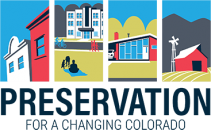The list of resources to support a preservation project is potentially endless, limited only by time and imagination. As a starting point, this section of the report identifies many of the programs and collaborators mentioned in this report. This is not an exhaustive list, but should provide a good starting point for communities, non-profit groups, developers, property owners, or anyone else looking to begin or expand a historic preservation project in Colorado. Resources are divided into four main components:
-
Primary Resources and Technical Assistance: Where can you learn more about the programs featured in this report? Who can you contact for technical assistance related to historic preservation?
-
Grants and Funding: Where can you find more information about available grants and other sources of funding to support historic preservation?
-
Other Potential Collaborators: Beyond the main organizations discussed in this report, what other entities are good potential collaborators on preservation efforts?
-
Certified Local Government Program: Worth special mention, the CLG Program provides grant funding and technical assistance to cities, counties, and towns who meet certification standards established by the State Historic Preservation Office and the National Park Service.
Each resource listed in this section is accompanied by a brief description/explanation. Additional resources are provided (with links) at preservationbenefitscolorado.org.
Primary Resources and Technical Assistance
-
History Colorado: Office of Archaeology & Historic Preservation (OAHP). Administers the Certified Local Government (CLG) program, state and federal rehabilitation tax credits, and the National Register, State Register, and Section 106 programs in Colorado.
-
Colorado Preservation, Inc. The state’s largest nonprofit promoting historic preservation statewide through advocacy, education, outreach, and preservation services to communities and individuals. Key programs include Colorado’s Most Endangered Places, the Saving Places Conference, and ongoing preservation services. The website contains a helpful preservation toolbox with links to dozens of resources.
-
State Historical Fund (SHF). The Grant Application Guide (latest edition Summer 2016) provides information and guidance regarding SHF grants, funding cycles, and related information. Competitive grants are made for any of the three projects types: Acquisition & Development, Education, and Survey & Inventory. Non-competitive grants are for smaller amounts of money and include the Historic Structure Assessment Grant, Archaeological Assessment Grant, and Emergency Grant.
-
Colorado Main Street. Administered by the Department of Local Affairs, this is the state branch of the program founded by the National Main Street Center, committed to historic preservation-based community revitalization. Officials can provide technical assistance to Main Street communities, as well as advice on how to bring new communities into the Main Street program.
-
Colorado Historical Foundation. A private, nonprofit organization that supports history and preservation projects statewide. The Foundation carries out the historic preservation Revolving Loan Fund for Colorado and an active statewide preservation easements program.
-
Colorado Creative Industries. A division of the Colorado Office of Economic Development & International Trade, this agency is focused on developing the creative sector to drive economic growth, and administers the Colorado Creative Districts program.
-
National Trust for Historic Preservation. The organization maintains a comprehensive, up-to-date website (savingplaces.org) with a wide range of resources relating to technical support, funding, advocacy, and more.
-
Local non-profit preservation organizations. Many towns, cities, and regions in Colorado have preservation-specific organizations that offer technical assistance, funding, and advocacy. Examples include the Fort Collins Historical Society, Historic Boulder, Historic Pueblo, Historic Routt County, and Historic Salida.
-
Local preservation commissions. Local preservation commissions in Colorado maintain resources such as inventories of historic properties, information on the local historic designation process, and guides for development projects affecting historic resources. They also can offer assistance in evaluating potential development projects and obtaining historic designation.
-
Local city or county planning departments. Even in communities without a dedicated preservation office or program, the local planners often can answer questions about potential preservation projects (e.g., applicable local programs, funding sources).
Grants and Funding
National:
National Trust for Historic Preservation
US Department of Agriculture (Housing Preservation Grants)
Federal Rehabilitation Tax Credit
Colorado:
State Historical Fund
State Rehabilitation Tax Credit
Colorado Historical Foundation Revolving Loan Fund
Certified Local Government Grants
Colorado’s Cultural and Heritage and Agritourism Program (CHAMP)
Colorado Department of Local Affairs
Colorado Department of Public Health and Environment - (Brownfields Program)
Colorado Brownfields Partnership
Colorado Division of Reclamation and Mining Safety
Private Foundations (such as):
1772 Foundation
El Pomar Foundation
Gates Family Foundation
Boettcher Foundation
Anschutz Family Foundation
Other Potential Collaborators
Beyond the main organizations discussed above, the following agencies and organizations are potential collaborators on preservation efforts:
Economic Development
National Trust Community Investment Corporation (provides equity and debt to real estate projects that help revitalize low- and moderate-income communities)
Local banks (support tax credit transactions under the Community Reinvestment Act)
Local and regional community foundations (e.g., Yampa Valley Community Foundation, Alma Foundation, Summit Foundation)
Local urban renewal authority
Public Lands and Environmental Protection
Bureau of Land Management
US Forest Service
Colorado Parks and Wildlife
Colorado Natural Heritage Program
Hazard Mitigation
Federal Emergency Management Agency
Colorado Department of Local Affairs
Colorado Cultural and Historic Resources Task Force
Housing
US Department of Housing and Urban Development (administers the Low-Income Housing Tax Credit program)
Local housing authorities (e.g., Denver Housing Authority)
Tourism
Colorado Tourism Office
Colorado Scenic and Historic Byways Commission (CDOT)
National Heritage Areas (Cache la Poudre River, Sangre de Cristo, and South Park)
Certified Local Government Program
Recognizing that historic preservation issues are often best understood and addressed at the local level, Congress created the Certified Local Government program in 1980. A federally-funded, state-administered program for local governments interested in historic preservation, the CLG program provides grant funding and technical assistance to cities, counties, and towns who meet certification standards established by the State Historic Preservation Office and the National Park Service.
As of 2016, 57 Colorado communities benefit from CLG status. These communities include large cities like Denver and Ft. Collins, counties such as Gunnison and Otero, as well as smaller cities and towns like Starkville, Steamboat Springs, and Cortez. What all CLGs have in common is a firm belief in the public benefits of historic preservation and a strong commitment to preserving the historic places that are essential to their community’s unique identity.
Colorado CLGs:
-
Provide local preservation leadership and technical assistance through the activities of their Historic Preservation Commission and staff;
-
Adopt a preservation ordinance and review projects within their jurisdiction
-
Undertake surveys to identify and evaluate historic properties;
-
Review nominations for local landmark designation and comment on nominations to the National Register of Historic Places;
-
Participate in Section 106 review of federally-funded projects;
-
Choose to review state tax credit projects for residential properties on behalf of the SHPO.
CLG status provides a number of key benefits:
-
Local landmarks designated by CLGs are eligible for the state tax credit program and SHF grants;
-
Access to technical assistance and guidance from the SHPO and NPS;
-
Access to annual no-match grants available only to CLGs.
Several Colorado CLGs offer local preservation incentives such as:
Property Tax Rebates
Castle Rock, Denver, Erie, Glenwood Springs, Idaho Springs, Littleton, Manitou Springs, Steamboat Springs
Sales Tax Rebates
Boulder
Revolving Loan Funds
Alamosa, Aspen, Fort Collins, Greeley, Louisville, Loveland
Grants Programs
Black Hawk, Boulder County, Castle Rock, Crested Butte, Cripple Creek, Fort Collins, Lafayette, Littleton, Louisville, Loveland, Manitou Springs, Park County

